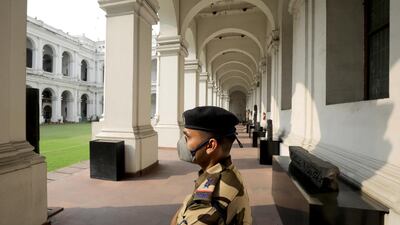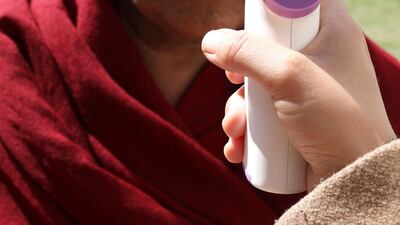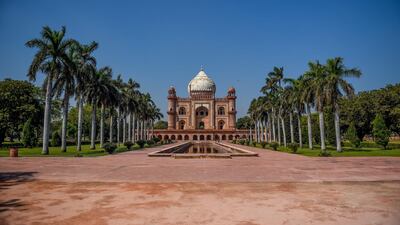Saudi Arabia’s decision to convene a special meeting of the G20 group of nations could not come at a better time as far as global attempts to meet the challenge of the coronavirus are concerned.
Arguably the most depressing feature of the pandemic is that, rather than bringing countries together to meet the biggest challenge the world has faced since the Second World War, it has set some nations against one another, with too many influential governments apparently more interested in protecting their own interests than pooling their resources for the common good.
An emergency G20 summit is therefore vital if some world leaders are to be persuaded to stop indulging in their self-defeating blame game and, instead, work together to defeat the virus and help each other to overcome the very significant challenges the pandemic poses, both to the well-being of their respective citizens as well as the well-being of the global economy.
Announcing that Saudi Arabia is to hold a virtual meeting of leaders from the world's largest economies next week, the Kingdom said it aimed to "put forward a co-ordinated set of policies to protect people and safeguard the global economy".
The summit will be a unique event; rather than meeting to face-to-face, it will be conducted by video link, thereby respecting the prevailing medical advice in favour of social distancing and isolation to prevent the virus from spreading further. By far the most important issue the meeting needs to address is the unseemly bickering that has broken out between some world leaders over who is to blame for the outbreak, as well as disputes over which countries are best prepared to deal with the virus.
At a time when international co-operation should be at the heart of the battle to defeat the pandemic, the opposite appears to be the case among some of the strongest nations of the world.
China set the tone at the start of the crisis when it initially refused assistance from the World Health Organisation to deal with the virus and, instead, pursued its own, unilateral measures to contain the outbreak, including the wholesale lockdown of entire cities. Since then we have seen the Trump administration adopt a similarly isolationist approach, not least when Washington announced that it was imposing an immediate travel ban on Europe without even bothering to observe the basic courtesy of discussing the decision with America’s so-called allies in Europe.
Moreover, US President Donald Trump’s insistence on constantly tweeting about what he calls “the Chinese virus” has provoked a fierce response from Beijing, with senior Chinese officials claiming that the virus originated in the US, and not China, and that Washington owes China “an explanation".
According to Zhao Lijian, the deputy minister of China’s Foreign Ministry Department, the US Army may have brought the disease to China last October when American troops visited the Chinese city of Wuhan, where the outbreak originated at the end of last year.
The row has escalated to the point where China has expelled a number of American journalists from the country, raising fears that the tit-for-tat recriminations between Washington and Beijing could provoke a new trade war between the two countries, with all the implications that might have for the world’s battered economy.
Then there are the deep divisions that have emerged in Europe over how best to respond to the pandemic.
Having been slow to respond to the initial outbreak, the European Union is seeking to impose its own restrictions on non-EU citizens entering the bloc. The more worrying concern for Brussels, though, is the deepening divisions among member states as European leaders appear more interested in protecting their national interests rather than those of Europe as a whole.
Perhaps the most egregious example of the fall-out among rival EU states was when the German government denied a request from neighbouring Italy to supply much-needed medical equipment, such as face masks and ventilators. In addition other EU states, such as Austria and the Czech Republic, responded to the extensive coronavirus outbreak in Italy by closing their borders to their Italian neighbours, a clear breach of the EU’s rules that allow for free movement of all citizens of the union between member states.
Add to this the self-centred approach being adopted to the pandemic by other leading countries, and it is clear that the G20 summit has a number of notable challenges to overcome if it is to succeed in securing a more co-ordinated global response to the crisis.
Read More from Con Coughlin
Certainly, the top priority at next week’s gathering must be to persuade world leaders to formulate an agreed international formula on how to defeat the virus, which can only be achieved by sharing knowledge and resources. For example the two countries that have so far been most effective at controlling the spread of Covid-19 are South Korea and Singapore, which have succeeded in limiting its spread by a combination of widespread testing, isolation of each individual infected and using mobile phone data to track those who might be at risk.
The implementation of such measures in Europe, which has now become the epicentre of the outbreak, could have a similar beneficial impact.
There is a pressing need for the world’s leading nations to work more closely together on producing the equipment needed to deal with the pandemic, such as ventilators. Global co-operation is also essential in finding an effective vaccine against the virus.
One of the major concerns of health officials is that, once the outbreak has been dealt with, the world will be hit by further pandemics if there is no vaccine that acts against the virus.
The novel coronavirus has demonstrated that it does not respect borders or nations, so the only way to end the pandemic is for world leaders to pool their resources and work together, rather than indulging in pointless bickering.
Con Coughlin is the Telegraph’s defence and foreign affairs editor
GOLF’S RAHMBO
- 5 wins in 22 months as pro
- Three wins in past 10 starts
- 45 pro starts worldwide: 5 wins, 17 top 5s
- Ranked 551th in world on debut, now No 4 (was No 2 earlier this year)
- 5th player in last 30 years to win 3 European Tour and 2 PGA Tour titles before age 24 (Woods, Garcia, McIlroy, Spieth)
Dhadak 2
Director: Shazia Iqbal
Starring: Siddhant Chaturvedi, Triptii Dimri
Rating: 1/5
Benefits of first-time home buyers' scheme
- Priority access to new homes from participating developers
- Discounts on sales price of off-plan units
- Flexible payment plans from developers
- Mortgages with better interest rates, faster approval times and reduced fees
- DLD registration fee can be paid through banks or credit cards at zero interest rates
Roger Federer's 2018 record
Australian Open Champion
Rotterdam Champion
Indian Wells Runner-up
Miami Second round
Stuttgart Champion
Halle Runner-up
Wimbledon Quarter-finals
Cincinnati Runner-up
US Open Fourth round
Shanghai Semi-finals
Basel Champion
Paris Masters Semi-finals
Jetour T1 specs
Engine: 2-litre turbocharged
Power: 254hp
Torque: 390Nm
Price: From Dh126,000
Available: Now
The five pillars of Islam
1. Fasting
2. Prayer
3. Hajj
4. Shahada
5. Zakat
More from Neighbourhood Watch:
IF YOU GO
The flights
FlyDubai flies direct from Dubai to Skopje in five hours from Dh1,314 return including taxes. Hourly buses from Skopje to Ohrid take three hours.
The tours
English-speaking guided tours of Ohrid town and the surrounding area are organised by Cultura 365; these cost €90 (Dh386) for a one-day trip including driver and guide and €100 a day (Dh429) for two people.
The hotels
Villa St Sofija in the old town of Ohrid, twin room from $54 (Dh198) a night.
St Naum Monastery, on the lake 30km south of Ohrid town, has updated its pilgrims' quarters into a modern 3-star hotel, with rooms overlooking the monastery courtyard and lake. Double room from $60 (Dh 220) a night.
The specs: 2018 Ducati SuperSport S
Price, base / as tested: Dh74,900 / Dh85,900
Engine: 937cc
Transmission: Six-speed gearbox
Power: 110hp @ 9,000rpm
Torque: 93Nm @ 6,500rpm
Fuel economy, combined: 5.9L / 100km
Killing of Qassem Suleimani
Killing of Qassem Suleimani
Dust and sand storms compared
Sand storm
- Particle size: Larger, heavier sand grains
- Visibility: Often dramatic with thick "walls" of sand
- Duration: Short-lived, typically localised
- Travel distance: Limited
- Source: Open desert areas with strong winds
Dust storm
- Particle size: Much finer, lightweight particles
- Visibility: Hazy skies but less intense
- Duration: Can linger for days
- Travel distance: Long-range, up to thousands of kilometres
- Source: Can be carried from distant regions
UAE squad
Rohan Mustafa (captain), Ashfaq Ahmed, Ghulam Shabber, Rameez Shahzad, Mohammed Boota, Mohammed Usman, Adnan Mufti, Shaiman Anwar, Ahmed Raza, Imran Haider, Qadeer Ahmed, Mohammed Naveed, Amir Hayat, Zahoor Khan
UAE currency: the story behind the money in your pockets
Killing of Qassem Suleimani
The smuggler
Eldarir had arrived at JFK in January 2020 with three suitcases, containing goods he valued at $300, when he was directed to a search area.
Officers found 41 gold artefacts among the bags, including amulets from a funerary set which prepared the deceased for the afterlife.
Also found was a cartouche of a Ptolemaic king on a relief that was originally part of a royal building or temple.
The largest single group of items found in Eldarir’s cases were 400 shabtis, or figurines.
Khouli conviction
Khouli smuggled items into the US by making false declarations to customs about the country of origin and value of the items.
According to Immigration and Customs Enforcement, he provided “false provenances which stated that [two] Egyptian antiquities were part of a collection assembled by Khouli's father in Israel in the 1960s” when in fact “Khouli acquired the Egyptian antiquities from other dealers”.
He was sentenced to one year of probation, six months of home confinement and 200 hours of community service in 2012 after admitting buying and smuggling Egyptian antiquities, including coffins, funerary boats and limestone figures.
For sale
A number of other items said to come from the collection of Ezeldeen Taha Eldarir are currently or recently for sale.
Their provenance is described in near identical terms as the British Museum shabti: bought from Salahaddin Sirmali, "authenticated and appraised" by Hossen Rashed, then imported to the US in 1948.
- An Egyptian Mummy mask dating from 700BC-30BC, is on offer for £11,807 ($15,275) online by a seller in Mexico
- A coffin lid dating back to 664BC-332BC was offered for sale by a Colorado-based art dealer, with a starting price of $65,000
- A shabti that was on sale through a Chicago-based coin dealer, dating from 1567BC-1085BC, is up for $1,950
Gothia Cup 2025
4,872 matches
1,942 teams
116 pitches
76 nations
26 UAE teams
15 Lebanese teams
2 Kuwaiti teams
More from Neighbourhood Watch:
The specs: 2018 Peugeot 5008
Price, base / as tested: Dh99,900 / Dh134,900
Engine: 1.6-litre turbocharged four-cylinder
Transmission: Six-speed automatic
Power: 165hp @ 6,000rpm
Torque: 240Nm @ 1,400rpm
Fuel economy, combined: 5.8L / 100km
Profile box
Company name: baraka
Started: July 2020
Founders: Feras Jalbout and Kunal Taneja
Based: Dubai and Bahrain
Sector: FinTech
Initial investment: $150,000
Current staff: 12
Stage: Pre-seed capital raising of $1 million
Investors: Class 5 Global, FJ Labs, IMO Ventures, The Community Fund, VentureSouq, Fox Ventures, Dr Abdulla Elyas (private investment)
The specs
Engine: 2.0-litre 4cyl turbo
Power: 261hp at 5,500rpm
Torque: 405Nm at 1,750-3,500rpm
Transmission: 9-speed auto
Fuel consumption: 6.9L/100km
On sale: Now
Price: From Dh117,059
OPINIONS ON PALESTINE & ISRAEL
Real estate tokenisation project
Dubai launched the pilot phase of its real estate tokenisation project last month.
The initiative focuses on converting real estate assets into digital tokens recorded on blockchain technology and helps in streamlining the process of buying, selling and investing, the Dubai Land Department said.
Dubai’s real estate tokenisation market is projected to reach Dh60 billion ($16.33 billion) by 2033, representing 7 per cent of the emirate’s total property transactions, according to the DLD.
How Filipinos in the UAE invest
A recent survey of 10,000 Filipino expatriates in the UAE found that 82 per cent have plans to invest, primarily in property. This is significantly higher than the 2014 poll showing only two out of 10 Filipinos planned to invest.
Fifty-five percent said they plan to invest in property, according to the poll conducted by the New Perspective Media Group, organiser of the Philippine Property and Investment Exhibition. Acquiring a franchised business or starting up a small business was preferred by 25 per cent and 15 per cent said they will invest in mutual funds. The rest said they are keen to invest in insurance (3 per cent) and gold (2 per cent).
Of the 5,500 respondents who preferred property as their primary investment, 54 per cent said they plan to make the purchase within the next year. Manila was the top location, preferred by 53 per cent.
More coverage from the Future Forum
KILLING OF QASSEM SULEIMANI



























